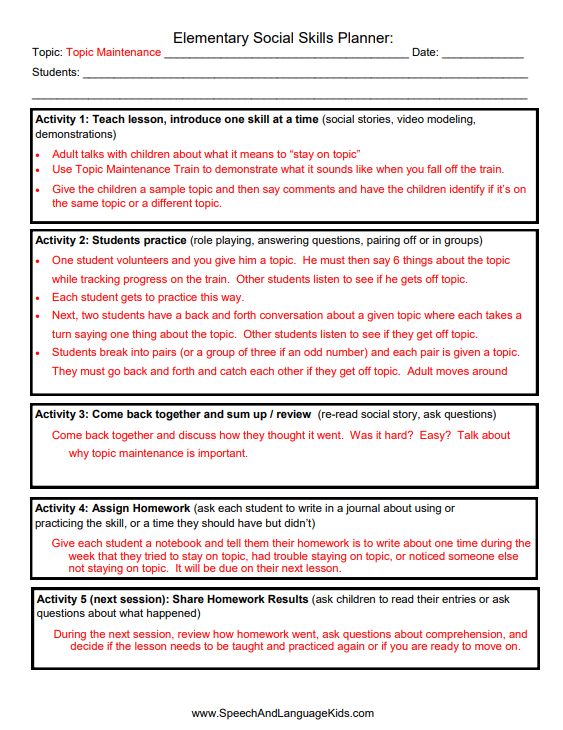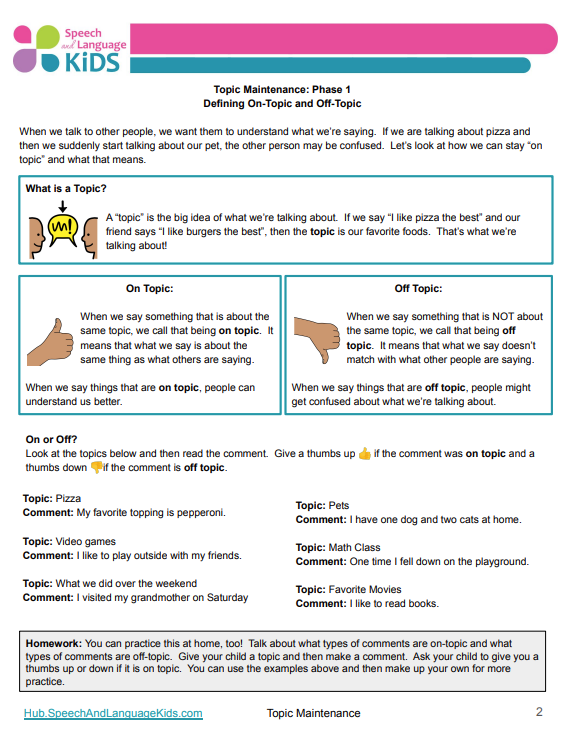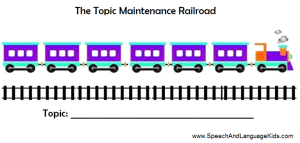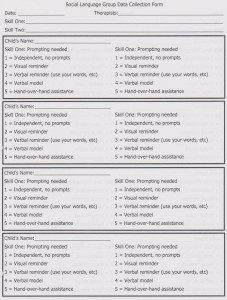Social Skills Group Therapy:
Activities for Children/Teens
Many of our children with language delays also have trouble with social skills. This may be due to certain conditions that impair social skills, like autism, or it may just be because these children have trouble learning language and social interactions rely heavily on language skills. Whatever the cause, one of the best ways to help improve social skills is through the use of social skills groups. Doing social skills training in a group setting allows children to practice new skills with their peers instead of just talking about them theoretically. Practice is crucial for these children to actually be able to use those skills in real life.
However, knowing exactly how to run a social skills group can be tricky. I’m going to present you with ways to run social skills groups for preschoolers, elementary schoolers, and older children as well. The methods I present here haven’t been deeply tested by research or anything like that, they just come from my experiences working with groups of kiddos on social skills and on research-based therapy techniques that have been around for a long time.
Social Skills Group Therapy for Preschoolers
Ever put a group of 4 preschoolers in a room together and then tried to teach them something hard? It’s not the easiest task in the world. Here’s what I recommend to make it easier:
Topics to Cover:
- Asking a friend to play
- Protesting when someone takes something away
- Saying “in a minute” if you’re not done with something
- Requesting and Responding to Requests
- Getting attention before requesting
- Introducing and responding to introductions
- Asking for help, responding to requests for help
- Showing something or making a comment on another child’s play
- Asking friend a question and responding to questions
- Offering a toy to another child
- Using a variety of strategies to perpetuate play/interactions
- Playing social games like tag
Social Skills Group Therapy for Preschoolers: Schedule
- Start with an opening song: We always did a song that included “hello” and “how are you” so they could practice answering social greetings
- Teach lesson, introduce one skill at a time
-Social Stories
-Video Modeling
-Demonstrations - Students practice
-Role Playing
-Answering Questions
-Pair off or in Groups - Come back together and sum up / review
- Give information to classroom teachers and parents to encourage practice after the session (or do some push-in yourself to get carry-over)
- At the beginning of the next session, review topic or observe in free play to see if the students are using the skill. If not, repeat the lesson again
Social Skills Group Therapy for Preschoolers: Sample Lesson Plan
Target Skill: Initiating Interactions (Asking a friend to play with a two-person toy, like playing catch)
Activity One: Greeting
- Adult greets the children and then begins a song. Before singing to each child, adult asks the group what the child’s name is. Then, lead adult sings the song:
- To the tune of Goodnight Ladies: “Hello ____, Hello ___, Hello ____ How are you?”
- Adult helps children with correct response.
Activity Two: Story
- Adult reads social story “Come Play with me”
- Sometimes I like to play by myself
- But sometimes, it’s more fun to play with a friend
- If I want to play with a friend, I can say “Play with me”
- A lot of toys are more fun with a friend
- If I want to ride a see saw with my friend, I can say “want to ride the see saw with me?”
- If I want to play catch with a friend, I can say, “Want to play catch with me?”
- If I want to play in the wagon with a friend, I can say “want to play in the wagon with me?”
Activity Three: Kid Demonstration
- Take two children and walk them through asking a friend to play by saying the child’s name and then asking a specific question (have two-person toys out as options
Activity Four: All children practice
- If you have multiple adults, separate into two groups and give each child a chance to practice. If you’re by yourself, it will just take a little longer.
Activity Five: One Child Chooses
- All children line up and one child gets to practice. The child chooses one child and one activity and then asks the child to play with that activity. They go off and play and another child comes up to practice. Make sure everyone gets a chance to be the chooser.
Activity Six: Review and Goodbye Song
- Adult reads the story and talks about what the children practiced as well as asking questions for comprehension. Then, adult leads a goodbye song that is the same as the original song but says “goodbye ___…Have a great day!”
Homework:
- Tell teachers and parents what you’re working on. Give them a brief summary and tell them what they can do to help the child practice at home.
- Ask them to give you feedback about how it goes.
When to Move On:
- Either do observations in the regular education setting or use your data from the controlled situations in therapy to see when they master the skill. Then, move on to another skill.
Social Skill Group Therapy for Elementary Students
Topics to Cover:
- Hygiene
- Manners
- Listening
- Sharing Materials
- Taking Turns
- Conversational Skills (like topic maintenance and responding to peers appropriately)
- Being respectful and having empathy
- Expected behavior for different situations (like classroom, hallway, cafeteria, etc.)
- Managing Emotions
- Making and Keeping Friends
Social Skill Group Therapy for Elementary:
Schedule
- Teach lesson, introduce one skill at a time
-Social Stories
-Video Modeling
-Demonstrations - Students practice
-Role Playing
-Answering Questions
-Pair off or in Groups - Come back together and sum up / review
- Assign Homework and ask each student to write in a journal about using or practicing the skill (or lack thereof)
- At the beginning of the next session, review topic and review their homework to see if the students are using the skill. If not, repeat the lesson again
Social Skill Group Therapy for Elementary School:
Sample Lesson Plan
Targeted Skill: Topic Maintenance
Activity One: Introducing Topic
- Adult talks with children about what it means to “stay on topic”
- Use Topic Maintenance Train to demonstrate what it sounds like when you fall off the train.
- Give the children a sample topic and then say comments and have the children identify if it’s on the same topic or a different topic.
Activity Two: Students Practice as a Group
- One student volunteers and you give him a topic. He must then say 6 things about the topic while tracking progress on the train. Other students listen to see if he gets off topic.
- Each student gets to practice this way.
- Next, two students have a back and forth conversation about a given topic where each takes a turn saying one thing about the topic. Other students listen to see if they get off topic.
Activity Three: Students Pair off to Practice
- Students break into pairs (or a group of three if an odd number) and each pair is given a topic. They must go back and forth and catch each other if they get off topic. Adult moves around room to monitor progress. Instruct them to pick a new topic after a few minutes.
Activity Four: Sum Up and Review
- Come back together and discuss how they thought it went. Was it hard? Easy? Talk about why topic maintenance is important.
Activity Five: Give Homework
- Give each student a notebook and tell them their homework is to write about one time during the week that they tried to stay on topic, had trouble staying on topic, or noticed someone else not staying on topic. It will be due on their next lesson.
Activity Six: The Next Session
- During the next session, review how homework went, ask questions about comprehension, and decide if the lesson needs to be taught and practiced again or if you are ready to move on.
Social Skills Group Therapy for Middle Schoolers and High Schoolers
Topics to Cover:
- Emotional Management (Anger, anxiety, etc.)
- Apologizing to friends
- Self-Confidence Issues/Self Appearance
- Peer pressure
- Bullying and Teasing
- Classroom Behavior
- Interactions with the Opposite Sex and Dating
- Conversational Skills (topic maintenance, compromising, group conversation rules)
- Online interactions
- Secrets and Lies
Social Skills Group Therapy for Middle/High Schoolers:
Schedule
- Introduce the topic. Ask for opinions about how the students do with that skill.
- Outline rules for standard behavior as it relates to that skill. Ask for student input here.
- Have students practice the skill in the controlled environment of the speech room.
- Assign homework to practice the skill in daily activities. Have them write about their attempts in journal including what they’re struggling with.
- Review journals and talk through trouble-shooting during next session. Talk about what each person could have done better in a certain situation. Have the student who was in the situation go first.
Social Skill Group Therapy for Middle/High Schoolers:
Sample Lesson Plan
Topic: How to Converse in a Group
Activity One: Introduce Topic
- Ask students how they do during group conversations
- Ask students if their friends ever give them negative feedback about their contributions to group conversations (including non-verbal like walking away or avoiding)
Activity Two: Outline Rules for Standard Behavior
- Have students help you come up with a set of standard rules. Make sure to be honest if the students come up with ideas that are not true. If they need help with this, watch a video of normal group conversations.
- Ideas for rules:
- Stay on the current topic unless it is very closely related
- Take the same number of conversational turns as everyone else
- Talk for the same length of time as everyone else
- Ask other people questions about the topic instead of only talking about yourself. Include those who haven’t had a chance to talk yet
- Listen to what others say and respond appropriately
- Match the volume and emotion of the group, don’t get too loud or too excited if no one else is
- Wait until the other person is done talking before you jump in. Only speak when no one else is speaking
Activity Three: Practice the Skill
- Tell students that you will be giving them a topic to talk about. Instruct them on how to respectfully point out if someone violates a rule of conversation.
- Introduce the topic and give one person the role of starting the conversation.
- Let the conversation continue but stop everyone when you see a rule violation. Point it out and ask the group at large what would have been a better way to do it.
- If you notice other problems that didn’t come up in the rules, pause and add a new rule to the list
Activity Four: Assign Homework
- Give each student a notebook and tell them to write an entry before the next session about a group conversation that they were a part of. Have them write how the followed the rules of group conversations or if they struggled with any rules.
Activity Five: Review Homework
- At the beginning of the next session, review how the homework went and see if you need to revise the rules or add to them based on the children’s experiences. Continue to work on that skill in the same way until mastery is achieved (or close to it).
Data Collection During Social Skills Group Therapy
When collecting data during social skills groups, I recommend that you create a quick form that will allow you to take data for all students on the same sheet. Decide on two very specific skills you will take data on. Break your overall skill into two parts (like getting attention and making a request for the overall skill of requesting). Use a rubric-style data collection based on how independently they performed the skills. Here’s an example of one that I’ve used:
Download the Lesson Planner and Sample Plans!
To make this as easy as possible for you, I’ve created blank lesson planning forms that you can use to plan your social skills groups. Please click the button to below to download the blank forms along with sample lesson plans (the ones from this article) and the blank data collection sheet.

About the Author: Carrie Clark, MA CCC-SLP
Hi, I’m Carrie! I’m a speech-language pathologist from Columbia, Missouri, USA. I’ve worked with children and teenagers of all ages in schools, preschools, and even my own private practice. I love digging through the research on speech and language topics and breaking it down into step-by-step plans for my followers.
Fun Fact: When my son was three, he once got mad at me and told me he was going to send me to Antarctica in nothing but a t-shirt. He had an overly large vocabulary for a 3-year-old….along with an overly large amount of sass. He still has both to this day.
Connect with Me:







Awesome suggestions…love the sample lesson plan.
Great!! Glad you liked it!
Thank you for sharing such a thorough lesson and giving us a freebie instead of sending us to TPT site.
This is one of the best explanation of how to start and maintain a social skills group on the internet that I’ve seen. This was excellent post I would definitely share it.
Wonderful! I’m glad you liked it and thank you for sharing!
Yes, thank you so much for sharing! I’m thinking about trying to start a social skills group at my work. I’m a pediatric OT. My 10 year old son could really benefit from this and there isn’t one in our area. However, I’d like him to be in a social skills group that is not lead by me;). Thanks again! I can’t wait to share his with my co workers.
Hi guys I am Samelihle
Hi guys I am Samelihle
Let’s plan something
thanks this was very helpful
pammie from chicago il
I like the format you suggest for groups. It’s simple, but provides structure!